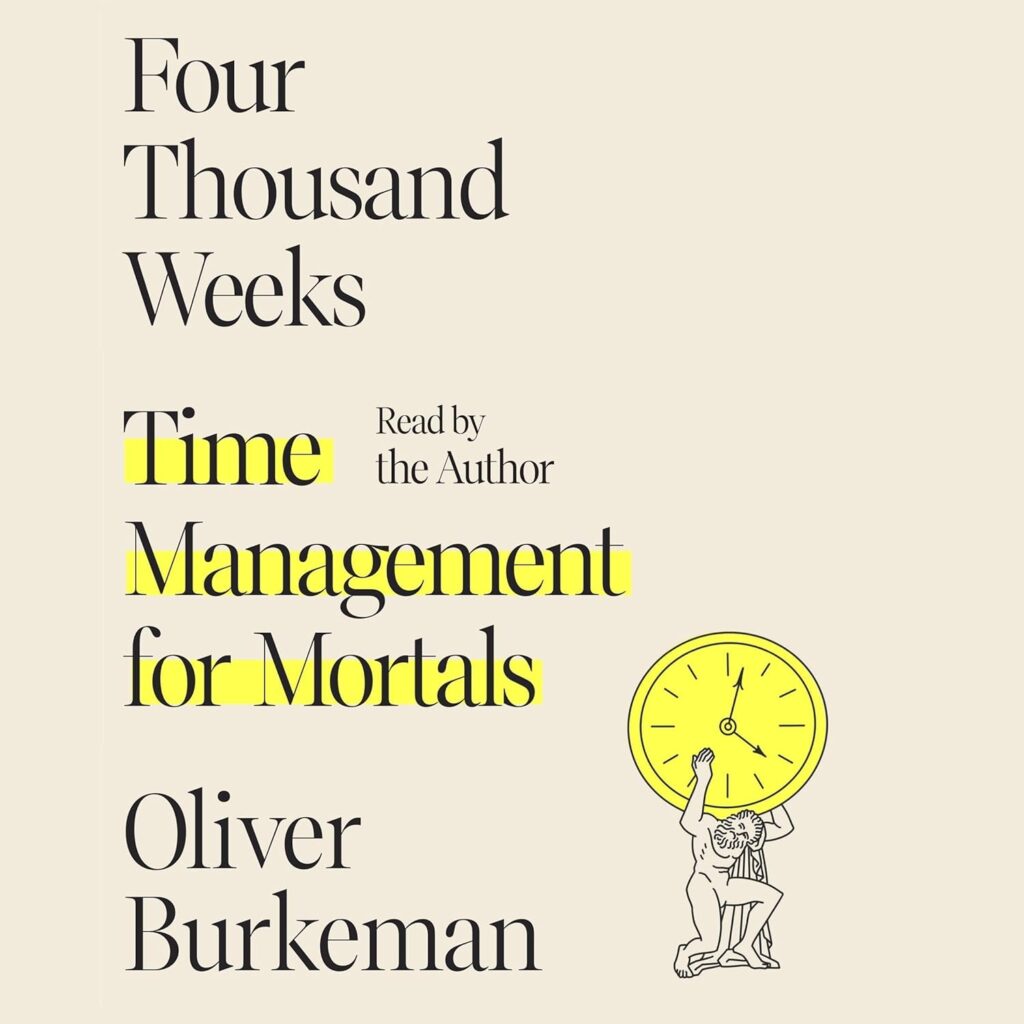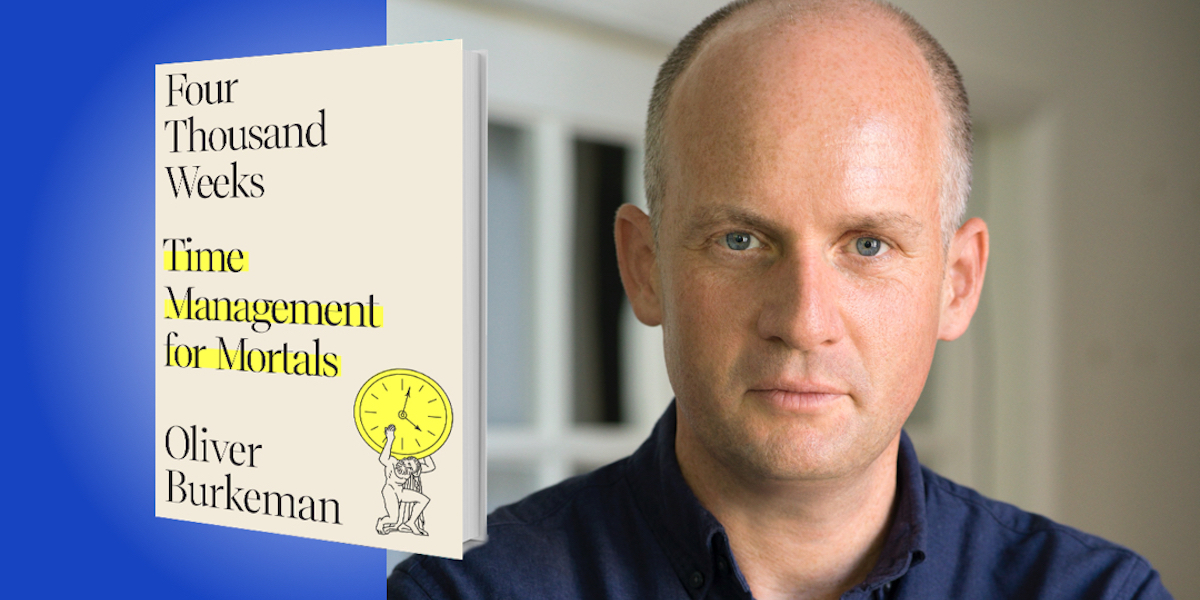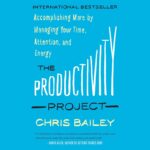
A few months ago, I caught myself staring at my calendar, wondering how an entire week had vanished—again. Meetings, emails, deadlines… all checked off, yet I couldn’t shake the feeling that I was just spinning my wheels. Have you ever felt that way? Like you’re busy all the time, but rarely present?
That week, I realized I wasn’t really living—just checking boxes.
That’s when I came across Four Thousand Weeks: Time Management for Mortals by Oliver Burkeman. The title alone stopped me in my tracks. Four thousand weeks—that’s the average human lifespan. Just hearing it made me pause and ask: What am I really doing with mine?
This book doesn’t promise productivity hacks or a miracle morning routine. Instead, it gently (and sometimes uncomfortably) pushes us to rethink our entire relationship with time. It’s not about getting more done—it’s about getting the right things done, and letting go of the rest.
In this article, I’ll walk you through the key insights from Burkeman’s refreshing perspective. If you’ve been feeling overwhelmed, stuck in the cycle of doing more but living less, this might just be the mindset shift you didn’t know you needed.
Buy Four Thousand Weeks ®at: Amazon (affiliate link)
About the Author – Oliver Burkeman

Oliver Burkeman is a British journalist and author known for his thoughtful, contrarian takes on modern life. For over a decade, he wrote the popular “This Column Will Change Your Life” for The Guardian, where he explored the psychology of happiness, productivity, and meaning.
What makes Burkeman’s work stand out is his ability to blend deep philosophical insight with real-world practicality—without the fluff. He challenges the cultural obsession with self-optimization and asks bigger, more uncomfortable questions: What if we stopped trying to control everything? What if our limits weren’t failures, but invitations to live more honestly?
Four Thousand Weeks is his most personal and profound work to date. It’s less a time-management book and more a manual for being fully human.
✨ Inspiring Quotes from Four Thousand Weeks
“Accepting our limitations is not defeat—it’s the doorway to freedom.”
“You can’t do everything. Trying to do so only distracts you from what really matters.”
“Time is not a commodity to be managed, but a companion to be respected.”
“Patience and presence are revolutionary acts in a world that glorifies speed.”
“The real magic happens when you stop chasing productivity and start choosing meaning.”
The Philosophy Behind Four Thousand Weeks
At its core, Four Thousand Weeks is less about time management tips and more about changing the way we think about time altogether. Instead of teaching you how to be more efficient or cram more into your schedule, Oliver Burkeman invites you to pause and reflect on a bigger truth: your time is limited—and that’s exactly what gives it meaning.

Rather than viewing time as something to conquer or control, Burkeman urges us to embrace its limits. When you stop chasing perfection and instead work within your natural boundaries, something surprising happens—you feel freer, not more restricted.
⏰ What the Title Really Means
Let’s do some quick math. If you live to be 80 years old, that’s roughly 4,000 weeks on this planet. Just 4,000. That number puts things into perspective, doesn’t it? The book’s title isn’t just clever—it’s a quiet reminder that life is finite, and how we use our time really does matter.
By facing that reality head-on instead of avoiding it, Burkeman says we can finally stop wasting energy trying to “do it all” and instead focus on doing what actually counts.
🧑💼 Who Is Oliver Burkeman?
Oliver Burkeman is a British journalist with a talent for turning conventional wisdom on its head—especially when it comes to how we think about productivity and happiness. His writing blends psychology, philosophy, and just the right amount of dry wit to keep things grounded and real.
What makes Burkeman stand out isn’t that he has the ultimate time-saving trick up his sleeve—far from it. He’s not trying to sell you the perfect morning routine or the next big productivity hack. Instead, he does something much more valuable: he asks us to pause and rethink our relationship with time altogether.
And that’s exactly what makes Four Thousand Weeks feel like a breath of fresh air. It doesn’t promise quick wins or magic formulas. What it offers is far more lasting—a quiet but powerful shift in how we choose to live.

📓 Part 1: Facing the Reality of Limited Time
Right from the opening pages, Burkeman doesn’t sugarcoat things: we’re working with a finite number of weeks—roughly 4,000 if we’re lucky. That number can hit hard, and it’s meant to. It reframes time not as something we spend endlessly but as something we steward carefully.
Instead of ignoring this limitation, the book urges us to acknowledge it fully. Burkeman argues that denying our mortality and limited time leads to burnout, distraction, and constant striving. But by facing this fact head-on, we can begin to make more intentional choices about how we use our time.
This means asking better questions—like: What truly deserves my attention? What am I saying yes to? And what am I unknowingly sacrificing in the process?
Rather than trying to fit everything in, Burkeman encourages us to be selective. To choose a few things that matter deeply, and let the rest fall away.
Because once we recognize that time is not infinite, every choice becomes sacred. And in that awareness lies the power to live fully—not frantically.
⚠️ Part 2: The Productivity Trap
Here’s the paradox Burkeman exposes: the more we chase productivity, the more overwhelmed we feel. It’s like running on a treadmill that speeds up the harder we try. No matter how much we accomplish, there’s always more to do, more to optimize, more to manage.
Burkeman calls this the “efficiency trap”—a cycle where our attempts to clear the to-do list only create more tasks. The real issue isn’t that we’re bad at managing time; it’s that we’re trying to do the impossible: fit an infinite list of demands into a very finite life.
The solution? Step off the treadmill. Recognize that you’ll never get everything done—and that’s okay.
Instead of pushing harder, Burkeman suggests we shift our mindset. Focus on fewer, more meaningful tasks. Be okay with imperfection. Choose presence over productivity.
It’s a tough pill to swallow in a culture that rewards busyness. But once we accept that we can’t do it all, we’re finally free to do what matters most.
Burkeman’s message isn’t about giving up—it’s about letting go of unrealistic expectations so we can reclaim our time, our energy, and our lives.
🧘♂️ Part 3: Embracing Finitude
This section of the book moves beyond acceptance and into transformation. Burkeman invites us to embrace our finitude—not just intellectually, but emotionally. Instead of seeing limitations as a problem, we can begin to treat them as a gift.
In a world obsessed with doing more, embracing finitude is radical. It means saying no more often. It means accepting that we’ll never read every book, visit every place, or master every skill. And that’s okay.
Burkeman suggests that true meaning comes not from endless options, but from choosing a few things and giving them our full attention. Focus brings depth. Limits bring clarity.
It’s a shift from ambition without direction to intention with humility. And while it may feel like we’re letting go of possibilities, we’re actually making space for something richer: a life rooted in presence, purpose, and peace.
🕊️ Part 4: Making Peace with Time
The final part of the book is where everything comes together. Burkeman encourages us to stop fighting time—and start making peace with it. This means releasing the illusion of control and choosing to live within the natural rhythms of life.
He introduces the concept of patience—not just as a virtue, but as a practice. In a world that worships speed and instant results, learning to wait, to slow down, to be okay with not knowing—this is where real strength lies.
Burkeman also highlights the importance of presence. Being fully engaged in the now—not just physically, but mentally and emotionally—is one of the most radical things we can do in our distraction-filled world.
And finally, he calls on us to protect our time through meaningful boundaries. Whether that means setting limits on work hours, unplugging from digital noise, or simply saying “no” more often, the goal is the same: to honor your time by living it deliberately.
Rather than seeing time as a resource to exploit, Four Thousand Weeks asks us to view it as a companion to respect.
In doing so, we discover a quieter kind of freedom—the freedom to live fully, even if imperfectly, in the time we have.
🛠️ Practical Time Strategies You Can Actually Use

While Four Thousand Weeks is deeply philosophical, it also offers real-world takeaways you can begin to apply immediately. Here are five core strategies Burkeman proposes:
✳️ Strategic Underachievement
Let go of trying to be excellent at everything. Consciously choose areas where you’ll settle for “good enough” so you can go deeper in the things that matter most. Saying “no” is not a failure—it’s a strategy.
✳️ The “Fixed Volume” Approach
Treat time like a fixed container. Instead of expanding your tasks to fill the day, fit your tasks into the time you’ve deliberately set aside. This shifts your mindset from unlimited hustle to healthy boundaries.
✳️ Urgent vs. Important
Learn to distinguish between what feels urgent and what is truly important. Constant reactivity leads to burnout. Make room for deep work and long-term goals, even if they aren’t yelling the loudest.
✳️ Time Boundaries
Design your day around clear start and end points. Create rituals for shutting down work, limiting digital distractions, and protecting rest. Treat your personal time as non-negotiable.
✳️ Presence Over Productivity
Multitasking isn’t mastery. Whether you’re having a conversation, eating a meal, or walking your dog—be there fully. Fulfillment comes not from speed, but from depth.
These aren’t just tips—they’re mindset shifts. Each one reminds us that time is not just something to manage, but something to honor.
Frequently Asked Questions (FAQ)
What is the summary of Four Thousand Weeks by Oliver Burkeman?
It’s a thought-provoking book that challenges the traditional view of productivity. Instead of focusing on how to get more done, Burkeman encourages us to accept the limits of our time and focus on what truly matters. He suggests embracing our finitude as a path to deeper meaning and peace.
What is the theory of 4,000 weeks?
The theory is built around the idea that the average human life spans roughly 4,000 weeks. Rather than being depressing, this number is meant to inspire urgency and clarity. When we acknowledge our time is finite, we begin to make wiser, more meaningful decisions.
Is Four Thousand Weeks worth reading?
Absolutely. If you’re feeling burnt out, overwhelmed, or stuck in a cycle of constant busyness, this book offers a refreshing alternative. It’s not about maximizing every second—it’s about finding meaning, letting go of the impossible, and living more fully.
How old are you if you live 4,000 weeks?
If you live 4,000 weeks, you’re around 76 to 77 years old. It’s a sobering reminder that life is shorter than we often admit, but also a call to make those weeks count.
What kind of reader will benefit most from this book?
Anyone who’s tired of hustle culture and looking for a slower, more meaningful rhythm to life. Especially helpful for creatives, thinkers, and professionals seeking clarity and peace.
Can the book’s ideas really be applied in daily life?
Yes, but they take practice. The ideas are simple, yet emotionally challenging. They require a mindset shift from “more, faster, better” to “intentional, mindful, enough.
🧾 Final Thoughts & Recommendation
Reading Four Thousand Weeks is like being gently but firmly nudged out of the chaos and into clarity. It doesn’t offer a step-by-step plan to master your schedule—instead, it invites you to master your mindset.
This book is for anyone tired of feeling overwhelmed, for those craving a slower, more intentional pace, and for people ready to stop doing more—and start living more.
Burkeman reminds us that life isn’t a checklist. And in recognizing the beauty of our limits, we might just find the freedom we’ve been chasing all along.
Highly recommended for:
- Burned-out professionals
- Creatives seeking depth over speed
- Anyone who’s ever wondered, “Where did the time go?”
In the end, it’s not about squeezing more into our 4,000 weeks—it’s about making those weeks count.
Watch the Core Message in Video Form
If you’d like a visual recap, this short video captures the essence of Four Thousand Weeks in a concise and engaging format:
It’s a perfect way to reinforce what you’ve just read—or to share with a friend who prefers learning through video.
📚 Ready to Rethink Time?
If Four Thousand Weeks resonated with you, why not take the next step?
🎧 Want to listen instead? Get the audiobook on Audible — and the best part? New Audible members can listen for FREE with a trial membership.
📘 Prefer reading? Get your copy on Amazon and dive into the full book at your own pace.
Disclosure: These are affiliate links, which means we may earn a small commission—at no extra cost to you—if you make a purchase. It helps support our site and keeps us sharing meaningful content. Thank you!
Make your weeks count—starting today.
If you enjoyed this summary of Four Thousand Weeks, you may also like:
- 8 Powerful Mental Health Benefits of Reading Daily: How Books Can Heal Your Mind
- Speed Reading Strategies to Consume Life-Changing Books Faster
- How Changing One Habit Can Lead to Massive Life Changes
- How to Talk to Anyone Leil Lowndes Review: Master the Secrets of Confident Connection
- The Life-Changing Magic of Tidying Up Summary – Marie Kondo




